Fleurs du Mal Magazine


Or see the index
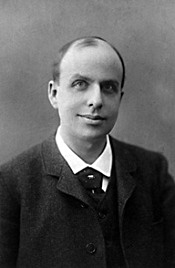
La Madone Amoureuse
Le ciel noir se piquait de torches résineuses,
Scintillantes lueurs, astres pâles d’amour.
Secouant du zénith leurs vapeurs lumineuses
En nuages d’encens au brasier du jour.
Se lustrait du vermeil bruni d’un disque pur,
Coeur jaunissant de fleur immobile et plantée
Comme une pâquerette aux mornes champs d’azur,
A travers l’infini sombre de l’étendue
La blancheur de la Vierge immense s’allongeait,
Colosse de vapeur vaguement épandue
Où le glaive éclatant de la lune plongeait.
Ce n’était plus le marbre aux arêtes précises
Où les Grecs découpaient la chair pâle des dieux,
Mais un esprit flottant en formes indécises
Et versant du brouillard vers la voûte des cieux.
Car l’idéal chrétien est fait de chair meurtrie,
Et d’orbites saignants et de membres broyés,
Tandis qu’abandonnant sa dépouille flétrie
L’âme ailée ouvre l’air de ses bras éployés.
Les dieux morts des anciens vivaient de notre vie;
Ils avaient nos amours; ils avaient nos douleurs;
Ils voyaient nos plaisirs en pâlissant d’envie
Et se vengeaient du rire en nous forçant aux pleurs.
Le Symbole vivant n’a que son existence
Dont la force idéale échappe à nos regards,
Et les martyrs en vain cloués sur leur potence
Interrogeaient l’éther avec leurs yeux hagards.
Mais l’élan passionné de la Vierge Marie
Avait noyé son âme en une ombre de chair
Faite de désirs fous, de luxure pétrie,
Où le cri de l’amour passait comme un éclair.
Cette chair transparente errait dans la pénombre,
Emergeait sous le froid de la Nuit, grelottait,
Et la Vierge trempée aux plis d’un voile sombre
Couvrait de ses deux mains son front et sanglotait.
Ses cheveux blonds coulaient en vagues dénouées
Qui ruisselaient à flots dans le fauve sillon
Des mamelles de brume à sa forme clouées
Par deux boutons puissants casqués de vermillon.
Et ses larmes roulaient en sanglantes rosées,
Jaillissant sous les cils parfumés de ses yeux
Comme un filet gonflé de leurs perles rosées,
Sa chevelure d’or tombait en plis soyeux.
Pendant qu’elle pleurait dans ses chairs cristallines,
Un nuage laiteux en panache fumait,
Fondant leur transparence en teintes opalines
Dont la neige mousseuse et légère écumait.
Et ses pâles cheveux aux couleurs effacées
Lentement noircissaient au creuset de la nuit,
Et l’or blond s’enfuyait de leurs teintes passées (5).
Ainsi que l’or mourant d’une braise s’enfuit
Ses veines se gonflaient de gouttes purpurines
Qui faisaient tressaillir ses nerfs en les baignant;
Un souffle sensuel dilatait ses narines
Et le désir perçait son coeur d’un clou saignant.
La blonde déité qui pleurait diaphane,
En cachant ses yeux bleus de ses longs doigts nacrés,
Avait pris les cheveux d’une brune profane
Et sa chair inhabile à des gestes sacrés.
Ce n’était plus la chaste et mystique Marie
Eclairée du halo pur de la Trinité,
Mais c’était une fille amoureuse, qui crie
Et gémit de désir sur sa virginité.
Elle entendait monter de langoureuses plaintes
De la vasque profonde où la Terre planait;
Le soupir attiédi des premières étreintes
En effluve d’amour vers sa bouche émanait.
Marcel Schwob
(1867-1905)
La Madone Amoureuse
• fleursdumal.nl magazine
More in: Archive S-T, Archive S-T, Marcel Schwob
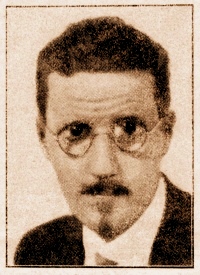
Bahnhofstrasse
The eyes that mock me sign the way
Whereto I pass at eve of day.
Grey way whose violet signals are
The trysting and the twining star.
Ah star of evil! star of pain!
Highhearted youth comes not again
Nor old heart’s wisdom yet to know
The signs that mock me as I go.
James Joyce
(1882-1941)
Bahnhofstrasse
fleursdumal.nl magazine
More in: Archive I-J, Archive I-J, Joyce, James, Joyce, James
A Portrait of One: Harry Phelan Gibb
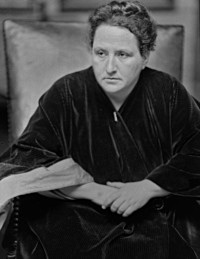 Some one in knowing everything is knowing that some one is something.
Some one in knowing everything is knowing that some one is something.
Some one is something and is succeeding is succeeding in hoping that thing.
He is suffering.
He is succeeding in hoping and he is succeeding in saying that that is something.
He is suffering, he is suffering and succeeding in hoping that in succeeding in saying that he is succeeding in hoping is something.
He is suffering, he is hoping, he is succeeding in saying that anything is something.
He is suffering, he is hoping, he is succeeding in saying that something is something.
He is hoping that he is succeeding in hoping that something is something.
He is hoping that he is succeeding in saying that he is succeeding in hoping that something is something.
He is hoping that he is succeeding in saying that something is something.
Gertrude Stein
(1874-1946)
A Portrait of One
Harry Phelan Gibb
fleursdumal.nl magazine
More in: Archive S-T, Archive S-T, Gertrude Stein, Stein, Gertrude
Occupying the Stage: the Theater of May ’68 tells the story of student and worker uprisings in France through the lens of theater history, and the story of French theater through the lens of May ’68.
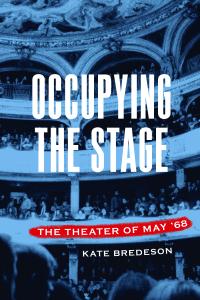 Based on detailed archival research and original translations, close readings of plays and historical documents, and a rigorous assessment of avant-garde theater history and theory, Occupying the Stage proposes that the French theater of 1959–71 forms a standalone paradigm called “The Theater of May ’68.”
Based on detailed archival research and original translations, close readings of plays and historical documents, and a rigorous assessment of avant-garde theater history and theory, Occupying the Stage proposes that the French theater of 1959–71 forms a standalone paradigm called “The Theater of May ’68.”
The book shows how French theater artists during this period used a strategy of occupation-occupying buildings, streets, language, words, traditions, and artistic processes-as their central tactic of protest and transformation. It further proposes that the Theater of May ’68 has left imprints on contemporary artists and activists, and that this theater offers a scaffolding on which to build a meaningful analysis of contemporary protest and performance in France, North America, and beyond.
At the book’s heart is an inquiry into how artists of the period used theater as a way to engage in political work and, concurrently, questioned and overhauled traditional theater practices so their art would better reflect the way they wanted the world to be. Occupying the Stage embraces the utopic vision of May ’68 while probing the period’s many contradictions. It thus affirms the vital role theater can play in the ongoing work of social change.
Occupying the Stage
The Theater of May ’68
Kate Bredeson (Author)
Publication Date: November 2018
Pages 232
Trim Size 6 x 9
Paper Text – $34.95
Northwestern University Press
Drama & Performance Studies
ISBN 978-0-8101-3815-5
# new books
Occupying the Stage
The Theater of May ’68
Kate Bredeson
• fleursdumal.nl magazine
More in: #Editors Choice Archiv, - Book News, - Book Stories, Archive A-B, Art & Literature News, AUDIO, CINEMA, RADIO & TV, Protests of MAY 1968, THEATRE
Manos de primavera. Antología poética de Federico García Lorca
Hands of Spring : Anthology of Poetry by Federico García Lorca
 La voz de Lorca ilustrada por la mano poética de Aitor Saraiba.
La voz de Lorca ilustrada por la mano poética de Aitor Saraiba.
La luna, el agua, la tierra, las imágenes lorquianas caminan de la mano de las poéticas ilustraciones de Aitor Saraiba. Una defensa de las voces únicas y las imágenes indestructibles. Un libro, sí, un canto a la libertad y al arte.
Lorca’s voice, illustrated by the poetic hand of Aitor Saraiba.
The moon, water, earth: Lorca’s images go hand-in-hand with the poetic illustrations of Aitor Saraiba. A defense of unique voices and indestructible images. A book—and a song to freedom and art.
Manos de primavera. Antología poética de Federico García Lorca
Hands of Spring : Anthology of Poetry by Federico García Lorca
By Federico Garcia Lorca
Hardcover
Pages: 128
10 x 11
Aug 20, 2019
Published by Montena
PRH Grupo Editoria
Category: Poetry
Spanish Language Nonfiction
ISBN 9788417671419
ISBN-13: 9788417671419
$20.95
# More poetry
Anthology of Poetry
by Federico García Lorca
• fleursdumal.nl magazine
More in: - Book News, 4SEASONS#Spring, Archive K-L, Archive K-L, Art & Literature News, Garcia Lorca, Federico, WAR & PEACE
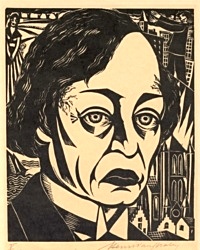
Vlaanderen, o welig huis
Vlaandren, o welig huis waar we zijn als genoden
aan rijke taaflen! – daar nu glooiend zijn de weiên
van zomer-granen, die hunne aêmende ebbe breien
naar malvend Ooste’ en statig dagerade-roden,
dewijl de morge’ ontwaakt ten hemel en ter Leië -:
wie kan u weten, en in ‘t harte niet verblijên;
niet danke’ om dagen, schoon als jonge zege-goden,
gelijk een beedlaar dankt om warme tarwe-broden?…
o Vlaandren, blijde van uw gevens-rede handen,
zwaar, daar ge delend gaat, in paarse en gele wade,
der krachten die uw schoot als rodend ooft beladen.
– Vlaandren, wie wéet u en de zomer-dageraden,
en voelt geen rilde liefde in zijne leden branden
‘lijk deze morgen door de veië Leië-landen?
Karel van de Woestijne
(1878 – 1929)
Vlaanderen, o welig huis
Portret van Karel van de Woestijne (1937) door Henri van Straten (1892 – 1944)
• fleursdumal.nl magazine
More in: Archive W-X, Archive W-X, Woestijne, Karel van de
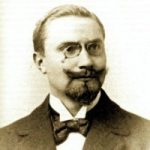
Fluch
Du sträubst und wehrst!
Die Brände heulen
Flammen
Sengen!
Nicht Ich
Nicht Du
Nicht Dich!
Mich!
Mich!
August Stramm
(1874-1915)
Fluch, 1914
• fleursdumal.nl magazine
More in: *War Poetry Archive, Archive S-T, Expressionism, Stramm, August
Het Russische absurdisme laat zich gemakkelijk terugbrengen tot één man: Daniil Charms. “Charms is kunst,’ schreef een vriend over hem.
 Met zijn opvallende verschijning, zijn excentriciteit, zijn creatieve tegendraadsheid was hij een fenomeen en groeide hij na zijn dood uit tot een wereldwijd bekende cultschrijver. “Mij interesseert alleen “onzin”,’ schreef hij ooit, “alleen dat wat geen enkele praktische zin heeft.’
Met zijn opvallende verschijning, zijn excentriciteit, zijn creatieve tegendraadsheid was hij een fenomeen en groeide hij na zijn dood uit tot een wereldwijd bekende cultschrijver. “Mij interesseert alleen “onzin”,’ schreef hij ooit, “alleen dat wat geen enkele praktische zin heeft.’
Charms blinkt uit in het tonen van de onsamenhangendheid van het bestaan en de onvoorspelbaarheid van het lot. Hij zoekt naar een ongefilterde verbeelding van de chaos die wij voortbrengen, los van zingeving en in de hoop op nieuwe ervaringen en aha-erlebnissen. In zijn werk laat hij willekeur vergezeld gaan van een stevige dosis, vaak zwartgallige, humor.
Voor het eerst verschijnt een grote uitgave van Charms’ werk in de Russische Bibliotheek, samengesteld uit proza, toneelteksten, gedichten, autobiografisch proza en kinderverhalen, en rijkelijk aangevuld met avantgardistische illustraties.
Auteur: Daniil Charms
Verzameld werk
Vertaald door Yolanda Bloemen
Russische Bibliotheek (RB)
Uitgeverij van Oorschot
Verschijningsdatum januari 2018
Taal Nederlands
1e druk
Bindwijze: Hardcover
Afmetingen 20,3 x 12,8 x 3,4 cm
736 pagina’s
ISBN 9789028282353
€ 44,99
• fleursdumal.nl magazine
More in: *Concrete + Visual Poetry A-E, - Book News, - Bookstores, Archive C-D, Archive C-D, Art & Literature News, Expressionism, Kharms (Charms), Daniil, Psychiatric hospitals
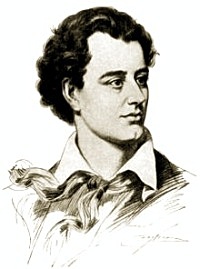
I Speak Not
I speak not, I trace not, I breathe not thy name;
There is grief in the sound, there is guilt in the fame;
But the tear that now burns on my cheek may impart
The deep thoughts that dwell in that silence of heart.
Too brief for our passion, too long for our peace,
Were those hours – can their joy or their bitterness cease?
We repent, we abjure, we will break from our chain, –
We will part, we will fly to – unite it again!
Oh! thine be the gladness, and mine be the guilt!
Forgive me, adored one! – forsake if thou wilt;
But the heart which is thine shall expire undebased,
And man shall not break it – whatever thou may’st.
And stern to the haughty, but humble to thee,
This soul in its bitterest blackness shall be;
And our days seem as swift, and our moments more sweet,
With thee at my side, than with worlds at our feet.
One sigh of thy sorrow, one look of thy love,
Shall turn me or fix, shall reward or reprove.
And the heartless may wonder at all I resign –
Thy lips shall reply, not to them, but to mine.
George Gordon Byron
(1788 – 1824)
I Speak Not
(Poem)
• fleursdumal.nl magazine
More in: Archive A-B, Archive A-B, Byron, Lord
10 décembre 1919: le prix Goncourt est attribué à Marcel Proust pour À l’ombre des jeunes filles en fleurs.
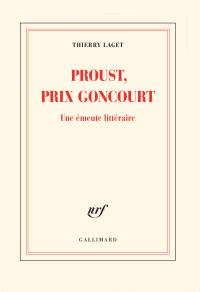 Aussitôt éclate un tonnerre de protestations : anciens combattants, pacifistes, réactionnaires, révolutionnaires, chacun se sent insulté par un livre qui, ressuscitant le temps perdu, semble dédaigner le temps présent.
Aussitôt éclate un tonnerre de protestations : anciens combattants, pacifistes, réactionnaires, révolutionnaires, chacun se sent insulté par un livre qui, ressuscitant le temps perdu, semble dédaigner le temps présent.
Pendant des semaines, Proust est vilipendé dans la presse, brocardé, injurié, menacé. Son tort? Ne plus être jeune, être riche, ne pas avoir fait la guerre, ne pas raconter la vie dans les tranchées.
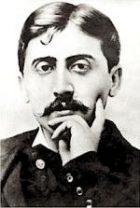 Retraçant l’histoire du prix et les manœuvres en vue de son attribution à Proust, s’appuyant sur des documents inédits, dont il dévoile nombre d’extraits savoureux, Thierry Laget fait le récit d’un événement inouï – cette partie de chamboule-tout qui a déplacé le pôle magnétique de la littérature – et de l’émeute dont il a donné le signal.
Retraçant l’histoire du prix et les manœuvres en vue de son attribution à Proust, s’appuyant sur des documents inédits, dont il dévoile nombre d’extraits savoureux, Thierry Laget fait le récit d’un événement inouï – cette partie de chamboule-tout qui a déplacé le pôle magnétique de la littérature – et de l’émeute dont il a donné le signal.
Thierry Laget
Proust, prix Goncourt. Une émeute littéraire
Collection Blanche, Gallimard
Parution : 04-04-2019
272 pages
140 x 205 mm
ISBN : 9782072846786
Genre : Essais
Prix €19,50
# new books
Thierry Laget
Proust
prix Goncourt
• fleursdumal.nl magazine
More in: - Book News, Archive K-L, Archive O-P, Archive O-P, Art & Literature News, Awards & Prizes, Marcel Proust, Proust, Marcel
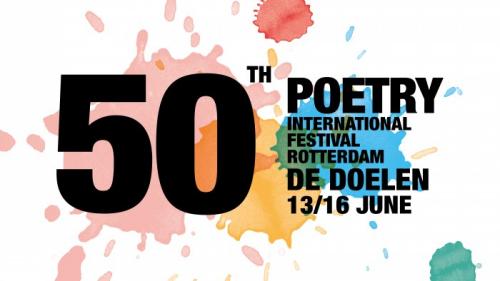
This year, the Poetry International Festival Rotterdam turns 50!
The milestone makes it the oldest festival in the city, and one of the oldest in the country, with a wealth of history and highlights. Nobel Prize-winning poets once stood on Poetry’s stages as bright young talents, and the festival is both a shining example for, and founding parent of, poetry festivals worldwide.
Poetry International celebrates its golden anniversary with an extra festive edition at Concertgebouw De Doelen, which also hosted the debut festival back in 1970. Trailblazing poets will deliver transformative work thrumming with the now.
Unique fusions of poetry by engaging artists from the worlds of music, cinema, and dance amplify the power, the beauty, and the personal impact of poetry, here in the form of an intimate reading or workshop, there as a multidisciplinary theatrical poetry spectacle. Right in the heart of the city, inviting, challenging, unmissable.
What Happened to the Future? Since 1970, poetry luminaries from all over the world travel to Rotterdam for the annual Poetry International Festival. Thousands of poets have shared their work on the stages of De Doelen and the Schouwburg, but also in the city’s squares, parks, and trams. A landmark anniversary like this is an invitation to look back and celebrate the past, but at the same time, Poetry International will be looking ahead. Under the title What Happened to the Future?, the 50th Poetry International Festival unites its rich history with the world’s poems and poets of today and tomorrow.
The Metropole Orchestra – nominated for 18 Grammy Awards – will open the 50th Poetry International Festival with a literal bang. In this theatrical kick-off, the orchestra will perform unique duets with poets, including the legendary Last Poets, godfathers of hip hop and spoken word. Inspired by the festival’s theme, “What Happened to the Future?”, poets from the festival’s rich past, such as Judith Herzberg, Antjie Krog, Rita Dove, Raúl Zurita, and Tom Lanoye, will perform side by side with poets of a more recent vintage, such as Marieke Lucas Rijneveld, Koleka Putuma, Patricia Lockwood, Lieke Marsman, Frank Báez, Sayaka Osaki, Ulrike Almut Sandig, and Galina Rymboe. Whether rooted in the past or inspired by the future, their readings will festively raise the curtains on this golden-anniversary edition.
From festival hub De Doelen, Poetry International will take you on a poetic walking tour through the heart of Rotterdam. Led by a guide from UrbanGuides, you will discover extraordinary art in public spaces and have surprising encounters with festival poets and spoken-word artists. Explore the city’s hidden stories together!
Practical festival information
Following the Opening Night on 13 June the 50th Poetry International Festival will presents three days packed with readings, concerts, workshops, specials, poetic city walks, interviews, award ceremonies and book presentations. Check the changing starting times beforehand! Almost all programs take place or depart from De Doelen, in the heart of the city within a 5-minute walk of Rotterdam Central Station.
The 50th Poetry International Festival will kick-off on 13 June in the Main Auditorium of de Doelen. On 14, 15 and 16 June most events will take place in or around the Jurriaanse zaal. De Doelen is situated within walking distance of Rotterdam Central Station
# More information on website Poetry International Festival
• fleursdumal.nl magazine
More in: #Archive A-Z Sound Poetry, #More Poetry Archives, - Book News, Art & Literature News, AUDIO, CINEMA, RADIO & TV, LITERARY MAGAZINES, Marieke Lucas Rijneveld, MODERN POETRY, Poetry International, STREET POETRY, Tom Lanoye
THE SCAPEGOAT (II)
A year is not a long time. It was short enough to prevent people from forgetting Robinson, and yet long enough for their pity to grow strong as they remembered. Indeed, he was not gone a year. Good behaviour cut two months off the time of his sentence, and by the time people had come around to the notion that he was really the greatest and smartest man in Cadgers he was at home again.
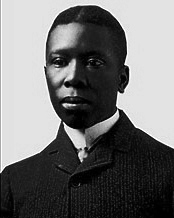 He came back with no flourish of trumpets, but quietly, humbly. He went back again into the heart of the black district. His business had deteriorated during his absence, but he put new blood and new life into it. He did not go to work in the shop himself, but, taking down the shingle that had swung idly before his office door during his imprisonment, he opened the little room as a news- and cigar-stand.
He came back with no flourish of trumpets, but quietly, humbly. He went back again into the heart of the black district. His business had deteriorated during his absence, but he put new blood and new life into it. He did not go to work in the shop himself, but, taking down the shingle that had swung idly before his office door during his imprisonment, he opened the little room as a news- and cigar-stand.
Here anxious, pitying custom came to him and he prospered again. He was very quiet. Uptown hardly knew that he was again in Cadgers, and it knew nothing whatever of his doings.
“I wonder why Asbury is so quiet,” they said to one another. “It isn’t like him to be quiet.” And they felt vaguely uneasy about him.
So many people had begun to say, “Well, he was a mighty good fellow after all.”
Mr. Bingo expressed the opinion that Asbury was quiet because he was crushed, but others expressed doubt as to this. There are calms and calms, some after and some before the storm. Which was this?
They waited a while, and, as no storm came, concluded that this must be the after-quiet. Bingo, reassured, volunteered to go and seek confirmation of this conclusion.
He went, and Asbury received him with an indifferent, not to say, impolite, demeanour.
“Well, we’re glad to see you back, Asbury,” said Bingo patronisingly. He had variously demonstrated his inability to lead during his rival’s absence and was proud of it. “What are you going to do?”
“I’m going to work.”
“That’s right. I reckon you’ll stay out of politics.”
“What could I do even if I went in?”
“Nothing now, of course; but I didn’t know—-“
He did not see the gleam in Asbury’s half shut eyes. He only marked his humility, and he went back swelling with the news.
“Completely crushed–all the run taken out of him,” was his report.
The black district believed this, too, and a sullen, smouldering anger took possession of them. Here was a good man ruined. Some of the people whom he had helped in his former days–some of the rude, coarse people of the low quarter who were still sufficiently unenlightened to be grateful–talked among themselves and offered to get up a demonstration for him. But he denied them. No, he wanted nothing of the kind. It would only bring him into unfavourable notice. All he wanted was that they would always be his friends and would stick by him.
They would to the death.
There were again two factions in Cadgers. The school-master could not forget how once on a time he had been made a tool of by Mr. Bingo. So he revolted against his rule and set himself up as the leader of an opposing clique. The fight had been long and strong, but had ended with odds slightly in Bingo’s favour.
But Mr. Morton did not despair. As the first of January and Emancipation Day approached, he arrayed his hosts, and the fight for supremacy became fiercer than ever. The school-teacher is giving you a pretty hard brought the school-children in for chorus singing, secured an able orator, and the best essayist in town. With all this, he was formidable.
Mr. Bingo knew that he had the fight of his life on his hands, and he entered with fear as well as zest. He, too, found an orator, but he was not sure that he was as good as Morton’s. There was no doubt but that his essayist was not. He secured a band, but still he felt unsatisfied. He had hardly done enough, and for the school-master to beat him now meant his political destruction.
It was in this state of mind that he was surprised to receive a visit from Mr. Asbury.
“I reckon you’re surprised to see me here,” said Asbury, smiling.
“I am pleased, I know.” Bingo was astute.
“Well, I just dropped in on business.”
“To be sure, to be sure, Asbury. What can I do for you?”
“It’s more what I can do for you that I came to talk about,” was the reply.
“I don’t believe I understand you.”
“Well, it’s plain enough. They say that the school-teacher is giving you a pretty hard fight.”
“Oh, not so hard.”
“No man can be too sure of winning, though. Mr. Morton once did me a mean turn when he started the faction against me.”
Bingo’s heart gave a great leap, and then stopped for the fraction of a second.
“You were in it, of course,” pursued Asbury, “but I can look over your part in it in order to get even with the man who started it.”
It was true, then, thought Bingo gladly. He did not know. He wanted revenge for his wrongs and upon the wrong man. How well the schemer had covered his tracks! Asbury should have his revenge and Morton would be the sufferer.
“Of course, Asbury, you know what I did I did innocently.”
“Oh, yes, in politics we are all lambs and the wolves are only to be found in the other party. We’ll pass that, though. What I want to say is that I can help you to make your celebration an overwhelming success. I still have some influence down in my district.”
“Certainly, and very justly, too. Why, I should be delighted with your aid. I could give you a prominent place in the procession.”
“I don’t want it; I don’t want to appear in this at all. All I want is revenge. You can have all the credit, but let me down my enemy.”
Bingo was perfectly willing, and, with their heads close together, they had a long and close consultation. When Asbury was gone, Mr. Bingo lay back in his chair and laughed. “I’m a slick duck,” he said.
From that hour Mr. Bingo’s cause began to take on the appearance of something very like a boom. More bands were hired. The interior of the State was called upon and a more eloquent orator secured. The crowd hastened to array itself on the growing side.
With surprised eyes, the school-master beheld the wonder of it, but he kept to his own purpose with dogged insistence, even when he saw that he could not turn aside the overwhelming defeat that threatened him. But in spite of his obstinacy, his hours were dark and bitter. Asbury worked like a mole, all underground, but he was indefatigable. Two days before the celebration time everything was perfected for the biggest demonstration that Cadgers had ever known. All the next day and night he was busy among his allies.
On the morning of the great day, Mr. Bingo, wonderfully caparisoned, rode down to the hall where the parade was to form. He was early. No one had yet come. In an hour a score of men all told had collected. Another hour passed, and no more had come. Then there smote upon his ear the sound of music. They were coming at last. Bringing his sword to his shoulder, he rode forward to the middle of the street. Ah, there they were. But–but–could he believe his eyes? They were going in another direction, and at their head rode–Morton! He gnashed his teeth in fury. He had been led into a trap and betrayed. The procession passing had been his–all his. He heard them cheering, and then, oh! climax of infidelity, he saw his own orator go past in a carriage, bowing and smiling to the crowd.
There was no doubting who had done this thing. The hand of Asbury was apparent in it. He must have known the truth all along, thought Bingo. His allies left him one by one for the other hall, and he rode home in a humiliation deeper than he had ever known before.
Asbury did not appear at the celebration. He was at his little news-stand all day.
In a day or two the defeated aspirant had further cause to curse his false friend. He found that not only had the people defected from him, but that the thing had been so adroitly managed that he appeared to be in fault, and three-fourths of those who knew him were angry at some supposed grievance. His cup of bitterness was full when his partner, a quietly ambitious man, suggested that they dissolve their relations.
His ruin was complete.
The lawyer was not alone in seeing Asbury’s hand in his downfall. The party managers saw it too, and they met together to discuss the dangerous factor which, while it appeared to slumber, was so terribly awake. They decided that he must be appeased, and they visited him.
He was still busy at his news-stand. They talked to him adroitly, while he sorted papers and kept an impassive face. When they were all done, he looked up for a moment and replied, “You know, gentlemen, as an ex-convict I am not in politics.”
Some of them had the grace to flush.
“But you can use your influence,” they said.
“I am not in politics,” was his only reply.
And the spring elections were coming on. Well, they worked hard, and he showed no sign. He treated with neither one party nor the other. “Perhaps,” thought the managers, “he is out of politics,” and they grew more confident.
It was nearing eleven o’clock on the morning of election when a cloud no bigger than a man’s hand appeared upon the horizon. It came from the direction of the black district. It grew, and the managers of the party in power looked at it, fascinated by an ominous dread. Finally it began to rain Negro voters, and as one man they voted against their former candidates. Their organisation was perfect. They simply came, voted, and left, but they overwhelmed everything. Not one of the party that had damned Robinson Asbury was left in power save old Judge Davis. His majority was overwhelming.
The generalship that had engineered the thing was perfect. There were loud threats against the newsdealer. But no one bothered him except a reporter. The reporter called to see just how it was done. He found Asbury very busy sorting papers. To the newspaper man’s questions he had only this reply, “I am not in politics, sir.”
But Cadgers had learned its lesson.
Paul Laurence Dunbar
(1872 – 1906)
The Scapegoat (II)
Short story
• fleursdumal.nl magazine
More in: Archive C-D, Archive C-D, Dunbar, Paul Laurence, Dunbar, Paul Laurence, Paul Laurence Dunbar, Paul Laurence Dunbar
Thank you for reading Fleurs du Mal - magazine for art & literature